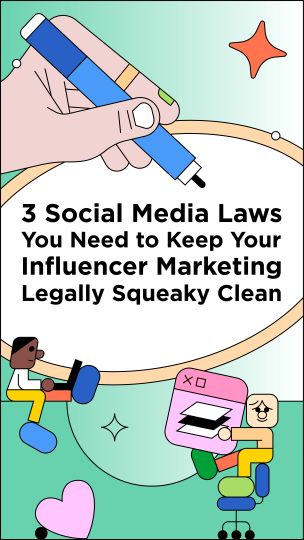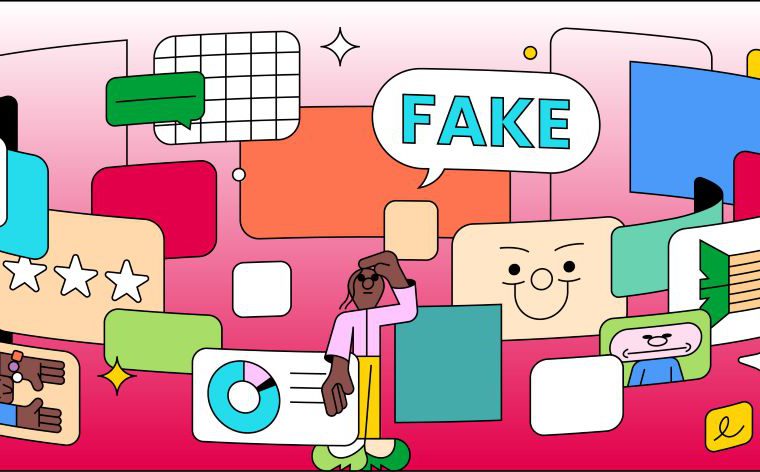In the Wild West of influencer marketing, the last thing you want is to get in trouble with social media laws. Don’t fret. The sheriff’s in town. (It’s us, we’re the metaphorical sheriff.) And we’re here to make sure you know what’s what when it comes to staying comfortably within the limits of social media laws.
Content is the name of the game in influencer marketing. Even if you’ve got a sharp-shooting campaign that’s hitting all your goals and nailing every bullseye of your target audience, content ownership issues can bring it all to a grinding halt.
We’ve compiled this rundown of the three social media laws you need to know to ensure you’re not left dueling with the FTC in an old-fashioned legal shootout. When it comes to content rights, we’re always first to draw. We know our stuff, and we want you to, too.
Giddy up, partners! Let’s make sure your campaigns are ace-high when it comes to content rights, so all the FTC can say in response is yeehaw! 🤠
Warning: Jump scare! Did you know a brand to pay an influencer for sponsored content, have no legal rights to the content it commissioned, and then get in trouble with the FTC and end up paying fines because the influencer didn’t follow social media laws and include proper disclosures in the post? Yikes! That’s why we wrote this post. So you can avoid a similar fate.
What is Intellectual Property and Why Should You Care?

Intellectual property (IP) is the tangible result of creativity. IP refers to creations of the mind, like inventions, artistic works, and yes, content. Basically, IP is the perceivable outcome produced from an idea. The creator is the owner of that intellectual property.
For example, let’s say an influencer in Indianapolis has an idea for a cute pic of her pup paddling with a pool noodle. The moment she snaps the picture, that idea is transformed into a tangible medium — the photo. That photo is intellectual property. And the influencer is the owner of it.
But this doesn’t mean that the influencer owns all photos of pups with pool noodles. She owns the specific creation (the photo) she produced from her initial idea. It’s the same way screenwriters own their scripts but they don’t own the broader underlying plots and tropes. For example, Nora Ephron owns the script to You’ve Got Mail as intellectual property. But she doesn’t own the enemies-to-lovers trope.
Of course, the line between ideas and their physical manifestations or resulting creations isn’t always so cut and dry, especially when brands are collaborating with influencers on joint effort creations. That’s why it’s important to explicitly define intellectual property ownership in your campaigns.
Let’s go a step further with our Indianapolis influencer’s pup with a pool noodle pic. As soon as she uploads that photo to social media (or her blog, newsletter, or anywhere else it is publicly published) it’s automatically protected by U.S. Copyright Law. (More on that below.)
Even without the copyright symbol ©, our Indy influencer has become a content creator and copyright owner. This is important because if you have influencers creating content for you, you need to know about the laws governing the creation, publication, and use of content.
Why an Influencer May Own Your Sponsored Content
Okay, so who owns what? Do influencers always own the content they create for brands? Is it always their intellectual property? Not exactly.
By default, U.S. Copyright Law automatically assigns ownership of content and the right to edit, distribute, and modify it to the original creator. In the world of influencer marketing, that means the influencers you work with own the content they create for you unless explicitly stated otherwise.
Enter: The importance of contracts.
Contracts vetted and created with the guidance of legal counsel can help you establish ownership of any intellectual property created for a campaign. This can include an explicit transfer of ownership from the creator to the brand or a breakdown of how ownership will be shared between the two parties.
Let’s say you skip the contract in favor of a good faith, laissez-faire approach to influencer marketing (highly do NOT recommend). You paid for the content, but you never got ownership rights transferred in writing. Even though you don’t own the content, your partnership with the influencer still makes you liable for it. That means if the FTC, or the platform the content is posted on, decides the post doesn’t meet compliance guidelines, you’re on the hook for that content you don’t even own.
Moral of the story: get your contracts straight. Ensure you’re clear on ownership with your influencer partners. And make sure you’re following all FTC, copyright, and platform guidelines. We’ll dive into those now.
3 Social Media Laws that Affect Content Creation and Your Influencer Campaigns
While social media marketing may not be as much of a legal minefield as traditional advertising, there are still several important considerations to be made when launching and running a campaign. Here’s a quick overview of the legal issues that will impact your social media marketing campaigns.
#1 FTC ENDORSEMENT GUIDELINES
When it comes to FTC guidelines, disclosure is everything. The purpose of FTC regulation is to ensure advertisers are being upfront with customers.
The FTC updated its guidelines in June 2023 to combat issues with deceptive reviews and endorsements. So if it’s been a minute since you’ve brushed up, we recommend taking a gander at the updated FTC Endorsement Guidelines. It’s a lot of reading, so here’s the gist.
All endorsements must be “clear and conspicuous.” This means making any endorsement that’s an ad (AKA one you paid for in money or products) must be disclosed in a super obvious way that’s easy to understand. There’s no gray area here. The FTC wants the differences between ads and unpaid posts to be black and white.
One of the easiest ways to add these disclosures is by using hashtags. These can include: #ad, #sponsored, #XYZ_Ambassador, and #XYZ_Partner. The FTC recommends getting specific and clear with your hashtags. Using underscores like those in the list above helps make hashtag disclosures easy to read and immediately understandable.
It’s not recommended to add “ad” at the end of a longer hashtag because the word is so short and not distinct enough to be immediately understood. If you’re going to use #ad, keep it just that simple. Basically, don’t try to pull a fast one or bury the disclosure.
For example, it would be better to have #XYZ_Partner or #ad rather than #XYZad.
NEW RULES ON REVIEWS
The June 2023 FTC guideline updates really cracked down on reviews. If you’re offering free products in exchange for reviews, you have to make it clear that reviews can be either positive or negative. Essentially, you can’t bribe customers or influencers to leave positive reviews with free products. If you are offering incentives for writing reviews, you have to make that super clear.
Also of note, employers are responsible for any reviews employees leave on their products. And fake negative reviews about competitors are considered a deceptive practice and also not allowed.
Basically, don’t tamper with reviews. You cannot delete or hide negative reviews or only post positive ones. You also can’t use reviews created by bots (or any fake entities) or written by those who have never used the product.
The FTC is looking into creating fines specifically for fake reviews (including AI-created ones), so be on the lookout for those rollouts in the future.
#2 FAIR ADVERTISING
On the note of not tampering with reviews or dogging on your competitors, you must legally play fair. In the United States, social media laws include fair advertising. It’s like the golden rule of advertising. Treat other brands the way you’d like to be treated.
Be truthful and honest in your claims. Both in reference to your own offerings and your competitors. If you play dirty, you’ll pay for it. Don’t lie or embellish. And don’t use other people’s logos or products to advertise your own products. This means no unsubstantiated claims and no falsely persuading customers.
#3 COPYRIGHT LAWS
For all the confusion and bewilderment, copyright is actually a pretty simple concept: If you created it, you own it — until and unless you enter an agreement that says otherwise.
For brands, it means influencers own the UGC they create if brands do not include clauses in influencer contracts that clearly identify the content as work made for hire.
Essentially, a work made for hire is something commissioned by an entity different from the individual creating it, where the creator has entered into an agreement that the commissioning entity is the legal owner and documented author of the work.
Influencer contracts should be customized to define the specific scope of work, ownership, and distribution rights. We’ll take you through a sample contract checklist below.
Why Content Ownership is So Darned Important
The main question around influencer-created content is who actually owns the content that is produced. When ownership is not clearly defined in writing, assume each piece of content created during an influencer campaign belongs to the individual influencer who created that content.
That means if you skip the contract, or generate a generic contract that doesn’t go into detail on how UGC can be used, you could run into some real issues when you try to use that UGC in other campaigns or on other platforms.
In general, copyright (content ownership) establishes a couple of important rights that you’re going to want. The Copyright Act of 1976 provides that the owner of a copyright has the exclusive right to do, or authorize, any of the following:
- Reproduce the copyrighted work in copies or phonorecords
- Prepare derivative works based upon the copyrighted work
- Distribute copies or phonorecords of the copyrighted work to the public by sale, rental, lease, or lending
- Perform the copyrighted work publicly (in the case of literary, musical, dramatic, and choreographic works, pantomimes, and motion pictures and other audiovisual works)
- Display the copyrighted work publicly (in the case of literary, musical, dramatic, and choreographic works, pantomimes, and pictorial, graphic, or sculptural works, including the individual images of a motion picture or other audiovisual work)
- Perform the copyrighted work publicly by means of a digital-audio transmission (in the case of sound recordings)
Properly establishing ownership means the brand gets full (or partial) rights to the sponsored content, which makes marketing efforts much easier.
Steer Clear of Third-Party Crashers
Another thing to keep in mind is the appearance of third-party content in the influencers’ posts. Third-party content includes images of people, products, locations, and other content that doesn’t belong to you (or the influencer creating the content). If your influencers are creating content that includes third parties, it could bring up issues with intellectual property rights.
If there are other people in an image or video, you may need their written consent if you want to use that content on social media. Without consent, you could be violating their rights to privacy and end up in some legal trouble.
Similarly, if your content features any third-party logos, products, slogans, songs, or anything of that nature, they can also restrict your ability to use the content. Trying to get permission for these “third-party crashers” can be a real headache, so it’s much easier if you make it clear not to use any third-party content.
Obviously, many marketers want to use viral TikTok sounds or catchy songs in their videos. If your campaigns include short-form video, you’ll likely want to include some sort of third-party content at some point. It can be done legally within each platform’s parameters. But that can be a difficult line to walk. For example, using the popular Stitch and Duet features on TikTok can raise some fair use concerns, but it’s not impossible to use them legally in your campaigns.
The easiest way to avoid third-party crashers is to steer clear of any non-original content in sponsored posts. But if you really want to use the latest meme or hottest song, just make sure you have all the proper permissions and you’ve cleared it all with your legal team.
Understand Platform Parameters
Different platforms have their own rules and regulations when it comes to the sharing and distribution of content posted there. For example, a retweet on X comes with a different allowance than sharing someone else’s post to your Instagram story or stitching another account’s TikTok.
Make sure you consider this when mapping out your campaign. It will absolutely affect how your content is produced and distributed after launching (especially if you’re running a cross-functional campaign across multiple platforms). Be sure to discuss this with your influencers too. All parties should be comfortable with whatever distribution decisions you make.
Create a Copyright Contract Checklist
The last thing we want as influencer marketers is for our campaigns to end before they even begin. That’s why keeping all these legal obligations in mind is paramount. Better to have the legal stuff handled before you launch rather than to be embroiled in a legal struggle when your campaign is supposed to be bringing in the big bucks.
While every campaign is different, some key factors should be addressed in every social media contract. Taking care of these items will ensure you’re on the right track to abide by social media laws. It’s a good idea to consult a lawyer or work with your in-house legal team to check and add to this list. There’s more to consider depending on your influencer relationships and campaign types. But we recommend* you start with these.
*Quick disclaimer: I love streaming old episodes of Suits as much as the next girl (Gina Torres… am I right?), but I am NOT a lawyer. This is not legal advice. It’s a good old-fashioned recommendation from one influencer marketer to another. But it’s not a substitute for the real deal. When it comes to social media laws, the best thing you can do is consult a lawyer.
With that said, here’s a jumping-off point for your copyright contract checklist:
1. GET CLEAR ON OWNERSHIP
Be clear about exactly which aspects of their content will belong to you, and which will belong to them (think about graphics, images, video, sound, captions, blog posts, etc.).
2. SET SHARING AND PLATFORM PARAMETERS
Decide which social platforms the content will be shared on, and whether it will appear on your company profiles or the influencer’s profiles.
3. DODGE THIRD-PARTY ISSUES
Explain to your influencer that they cannot use ANY third-party content in their post to avoid any issues further down the line. It’s a good idea to go into detail about what this means, especially if the influencer is unsure. Remember, paid content can have different fair use rules than UGC and organic content the influencer makes for fun unaffiliated with brands. Better to cover all your bases than run into a stitch fiasco on TikTok.
4. DETERMINE YOUR DISCLOSURES
Choose which FTC-approved hashtags you want to include in the caption. The safest option here is to go with the standard #ad or #sponsored to avoid confusion. And be sure those hashtags are easily visible in the post.
5. CREATE AN APPROVAL PROCESS FOR ALL PARTIES
Try to set up an approval process with the influencer so you can check through all the content before it goes live. This way you can double-check that it meets all your standards.
And remember, get that legal counsel! Better safe than sorry when it comes to social media laws.
Wrapping Up the Rundown on Social Media Laws
Let’s be honest. Most of us didn’t find ourselves in the wonderful world of influencer marketing because we’re jazzed about social media laws. But making cool creative content isn’t worth much to your bottom line if you end up in legal trouble that prevents it from ever being seen. Thankfully, once you know the law of the land, it’s easy to stay in the legal green zone.
We hope this article serves as a helpful jumping-off point as you navigate the legal landscape of influencer marketing. Remember to consult your legal team and refrain from putting your content cart before the legal horse. If you’d like help running your next campaign, or you’re interested in the legal resources of working with an influencer marketing company, we can help. Schedule a strategy call with one of our experts today. We can help make creating legally compliant campaigns a breeze!

About This Author
Ariana Newhouse | B2B Writer
I am a freelance writer and comedian based in Los Angeles. While making people laugh is my jam, it’s not always the company brand. So, I strive to make people feel something. My writing philosophy is collaborative, empathetic, and humanistic. At the end of the day, no matter the message, there are real people on both ends of the process.



